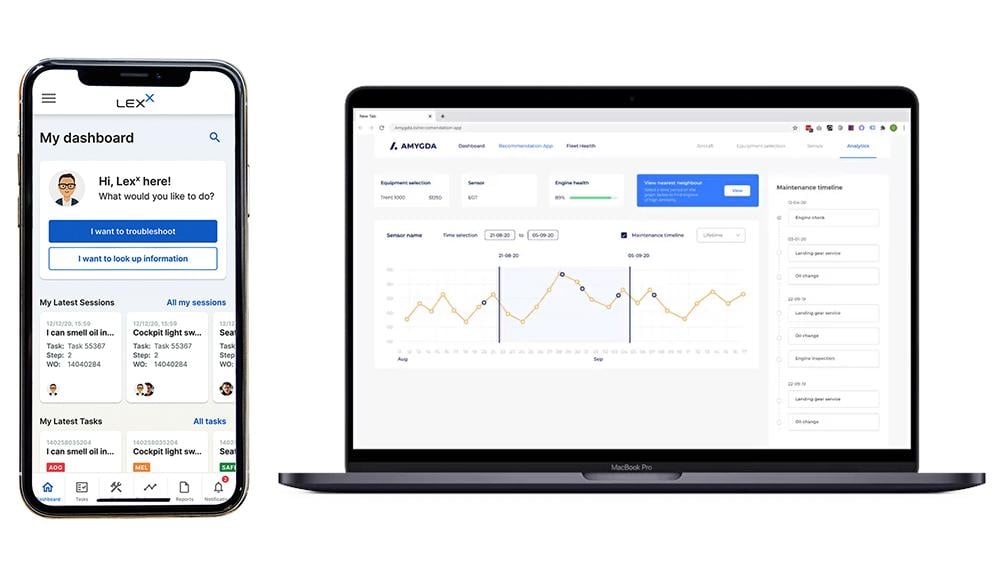
One of the aerospace industry’s biggest startup accelerators has narrowed down nearly 150 applications to 10 startups that will participate in its third cohort. Among the startups chosen by Aerospace Xelerated (formerly known as the ATI Boeing Accelerator) are two touting technology that is aimed at transforming the aftermarket: Amygda and LexX Technologies.
LexX Technologies
Australian startup LexX Technologies has created a platform that operates like a cross between Star Wars’ C-3PO droid and Apple’s Siri virtual assistant—custom-tailored for the MRO industry. The LexX platform uses artificial intelligence, machine learning and natural language processing to perform as an “intelligent digital colleague for technicians,” according to Mike Harris, head of marketing and general operations.
“IT systems have always been put in place for management to solve management problems, but no one was doing anything for the technicians themselves,” says Harris. At its core, Harris says the LexX platform has been built so that a technician can ask a question or describe a problem in their native language and the platform will respond back with accurate, data-based answers in simple language to guide them through their task.
Harris says the platform has been created to solve two major problems in MRO: its challenge of being “data rich but information poor” and combating the industry knowledge that is being lost to the aftermarket’s major retirement wave. “How do we capture and keep that wisdom so that it’s not gone forever?” stresses Harris, noting that younger technicians also tend to face aircraft and maintenance very differently.
The platform interfaces with relevant technical systems at an MRO and learns from data such as aircraft maintenance and regulator manuals, tech logs, task cards, airworthiness directives and safety bulletins. It also learns from a technician’s own behavior and a company’s organizational data to comprehend context and guide technicians through troubleshooting. For instance, Harris notes that the LexX platform has been able to deal with the “Denglisch” vernacular used by German MROs working with English aircraft records and it can account for the individual regulations an Australian airline flying European aircraft would need to deal with when flying into America.
Harris says the LexX platform has already been tested with some airlines and MROs, with one European MRO “imminently about to sign” a deal for the platform. The startup is also looking into use cases where the platform’s intelligence could be used by MROs for tasks like quoting and ordering spares. Although the startup has already made some MRO industry headway, Harris says the Aerospace Xelerated program will help validate the technology and give potential skeptics a better grasp of how the futuristic technology works.
Amygda
Also leveraging data to simplify maintenance operations is Derby, UK-based Amygda. Founded by two former Rolls-Royce engineers that worked on predictive maintenance and monitoring platforms, Amygda is a data observability platform for smart maintenance. Its goal is to reduce unnecessary maintenance and increase the reliability and sustainablity of assets.
According to Faizan Patankar, Amygda’s cofounder and CEO, the startup’s platform is seeking to bridge the gap between existing data platforms from OEMs. “What we noticed is that airlines and other stakeholders can have multiple OEMs that provide equipment or assets, but they then have to log into six, seven, eight different [data analytics] platforms, each of them doing things slightly differently,” he says.
Amygda, says Patankar, is one of the few platforms that can ingest data from multiple OEMs, focusing on high frequency data from a variety of sources such as sensors and legacy databases. Through a mix of historical and real-time data, the platform uses more than 200 machine learning models to predict asset failures.
Patankar says Amygda is one of the first players to bring “the world’s fastest time series database,” which is mainly used in investment banking, into aerospace. The platform runs its algorithms in minutes, meaning airlines would no longer need to wait for OEMs to obtain and process the data.
For example, Patankar says Amygda could be used to perform predictive maintenance on line replaceable units from smaller manufacturers and reduce unplanned downtime. “These aren’t large OEMs. They’re generally Tier 1, Tier 2 and Tier 3 suppliers who just don’t have the capacity to do all of the digitalization that’s still outstanding,” he says. “That’s where we really fit in. You can complement the existing OEMs by looking at equipment that they don’t hold.”
In addition to engaging with potential customers and de-risking its technology, Patankar says Amygda will leverage its experience in the startup accelerator to get more insights about where its technology would be most useful.
“By engaging with [a company] like Boeing, what we’re really looking for is where the gaps are across the industry, where maybe there isn’t as much coverage of data analytics as, say, the engine and aircraft generally get—and how can we help those manufacturers?” says Patankar.
Amygda is already working with airlines to develop an engine monitoring solution that works with snapshot and high-frequency data. The platform is also being validated in different industries, such as rail, mining, and oil and gas.





